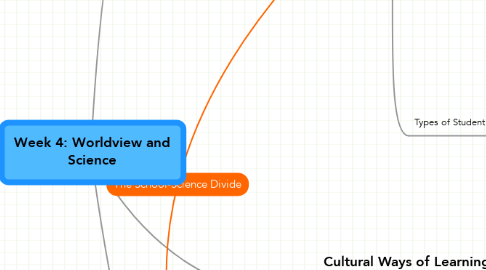
1. Science as subculture (Aikenhead)
1.1. Personal Orientation (Shapiro)
1.2. Culturally Validated Worldview (Cobern)
1.2.1. Life World
1.2.2. Science World
1.2.2.1. White Male Science
1.2.2.2. Western Modern Science
1.2.2.3. A gateway to cultural capital
1.2.2.4. "cognitive apartheid" (Cobern)
1.3. Community of discourse
1.3.1. Support
1.3.2. Disrupt
1.3.3. Or Cross?
1.4. Phelan's Culture = knowledge + skills + values
1.5. All kids might benefit from science-technology-society connections
1.6. Border Crossing
1.6.1. Cultures
1.6.2. Subcultures
1.6.2.1. Science Education
1.6.2.2. School Science
1.7. Types of Student Engagement (Costa)
1.7.1. Potential Scientists
1.7.1.1. AP Students
1.7.1.2. Difficulty engaging in real-world science after high school
1.7.2. Other Smart Kids
1.7.2.1. linked in through critical thinking of science
1.7.3. IDK Kids
1.7.4. Outsiders
1.7.4.1. "hazardous" engagement
1.7.5. Inside Outsiders
1.7.5.1. not of science, not of school
2. Cultural Ways of Learning (Rogoff & Gutierrez)
2.1. Repertoires of practice
2.1.1. linguistic
2.1.2. cultural-historical
2.1.3. authentic participation
2.2. Life is cultural
2.3. Ways that Culture is misinterpreted
2.3.1. Individual Traits
2.3.2. Encourages Overgeneralizations
2.3.3. Categories of Membership
2.3.3.1. Race
2.3.3.2. Gender
2.3.3.3. Class
3. School-lifeworld engagement (Lee & Buxton)
3.1. home-school disconnect
3.2. family life
3.3. review of the literature
3.3.1. tracking
3.3.2. parent involvement
3.3.2.1. "partner" in learning
3.3.2.2. knowledge of pedagogy
3.3.2.3. given reports of student learning
